Magen Cubed's Blog, page 43
July 28, 2011
On the writer's life
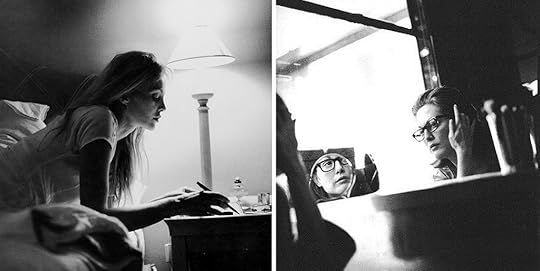
Photos by Veronique Vial
Get up. Open the curtains. Check phone. Feed the turtle, the dogs and the cats. Find caffeine. (Coffee with milk or herbal tea will do). Check phone again because you're forgetful. Check messages. Eat vitamins. Turn on the television. Flip through channels. (CNN, National Geographic, History Channel, Discovery Channel, Science Channel, MSNBC, BBCAmerica, then give up and leave it on TNT to watch Supernatural reruns). Stretching, yoga, deep-breathing, weight-lifting, cardio. Try to stretch out everything as far as it goes and hope you don't break something. Yogurt and granola, maybe oatmeal, maybe last night's black beans. More tea or coffee. Get out notebook. Write down crap about medical fetishism and black holes and children with holes in their heads. Maybe draw or paint. Turn off the TV. Go to the store and the bank, pay people money you don't have. Go home. Check phone. Check messages. Listen to music. Waste time on Tumblr and Livejournal. Get out notebook. Try to make sense of the crap you just wrote. More music. Edit manuscripts. Lunch. Watch Mythbusters on Science Channel. Go for a walk. Walk for an hour. Listen to music. Think about the crap you just wrote. Think about the crap you need to write when you get home. Shower. Check phone. Check messages. Dinner. Watch an hour or so of bad television. Get out notebook. Write while you watch bad television. Call your girlfriend. Talk about bad television and the crap you just wrote. More vitamins. More tea. More Tumblr and Livejournal. Look at the crap you just wrote. Check messages. Close the curtains. Feed the turtle, the dogs and the cats. Go to bed. Get up.
July 27, 2011
Pardon our dust, and other topics
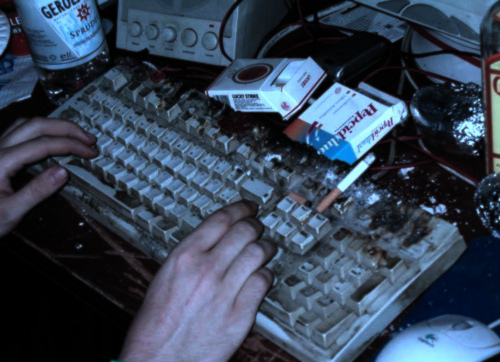
Long story short: This is a period of adjustment.
I've been staying up late again, drinking tea over dog-eared notebook pages, working on stories and doing a bit of housekeeping. I mean this in the literal and abstract. Cleaning up my blog-space, my Tumblr-space, adding links and shaking out the blankets. Editing manuscripts about cosmonauts and black holes and amputee fetishism, making lists of magazines I enjoy and want to submit to in the future. (Not unlike Wayne Campbell pawing at the guitar shop window, "It will be mine. Oh, yes. It will be mine." If you publish horror or bizarro, chances are you'll be hearing from me soon.) In real life I can often be seen in my neighborhood in a pair of running shoes, trying to get my two or three miles in, earbuds in place, probably listening to music. Probably being really obnoxious about it, too. (I've been listening to a lot of Nicki Minaj and working on my growling. Just ask the neighbors.) I've even tanned a little, if only just, the first summer in history I actually colored instead of just burning alive.
It's been a very eventful few weeks, indeed.
The novel is being fine-tuned. I keep saying it's done, and it's true. All the writing and editing is done, it's just in the final stages of clean-up to make sure it's as tight as it can be. The longer I dance for my life with sketches and character information, story snippets and excerpts, trying to get people interested, the closer I get to feeling like I got a handle on this. In most ways this book feels more like me than anything I've written in the last year. It brings me closer to home than I've been in a long while, closer to the kinds of stories I was writing before I started publishing (scribbled in notebooks, tucked away in desk drawers and under beds) and the kinds of readers I had cultivated on my own. For me publishing's been like going to a big party where I don't know anybody and everybody knows all the jokes but me. I nod, I smile, I play along (I might even try to tell a story or two), but I can't get comfortable. I'm always just left wondering if everybody thinks I'm boring.
The jury's still out on that, I guess. All I know is this is the first story in a long time that still puts a lump in my throat when I read through it. It's the kind of story that would creep me out if I picked it up in a bookstore or saw it on TV. It would make me laugh and cry and worry, checking under the bed for boxes and children with holes in their faces. Everybody who's read it so far says there's nothing quite like it out there, and I take that as a compliment for sure.
As I said, everything is currently in progress. Pardon my dust. I'll try to clean up after I'm done.
Pardon our dust, and other topics

Long story short: This is a period of adjustment.
I've been staying up late again, drinking tea over dog-eared notebook pages, working on stories and doing a bit of housekeeping. I mean this in the literal and abstract. Cleaning up my blog-space, my Tumblr-space, adding links and shaking out the blankets. Editing manuscripts about cosmonauts and black holes and amputee fetishism, making lists of magazines I enjoy and want to submit to in the future. (Not unlike Wayne Campbell pawing at the guitar shop window, "It will be mine. Oh, yes. It will be mine." If you publish horror or bizarro, chances are you'll be hearing from me soon.) In real life I can often be seen in my neighborhood in a pair of running shoes, trying to get my two or three miles in, earbuds in place, probably listening to music. Probably being really obnoxious about it, too. (I've been listening to a lot of Nicki Minaj and working on my growling. Just ask the neighbors.) I've even tanned a little, if only just, the first summer in history I actually colored instead of just burning alive.
It's been a very eventful few weeks, indeed.
The novel is being fine-tuned. I keep saying it's done, and it's true. All the writing and editing is done, it's just in the final stages of clean-up to make sure it's as tight as it can be. The longer I dance for my life with sketches and character information, story snippets and excerpts, trying to get people interested, the closer I get to feeling like I got a handle on this. In most ways this book feels more like me than anything I've written in the last year. It brings me closer to home than I've been in a long while, closer to the kinds of stories I was writing before I started publishing (scribbled in notebooks, tucked away in desk drawers and under beds) and the kinds of readers I had cultivated on my own. For me publishing's been like going to a big party where I don't know anybody and everybody knows all the jokes but me. I nod, I smile, I play along (I might even try to tell a story or two), but I can't get comfortable. I'm always just left wondering if everybody thinks I'm boring.
The jury's still out on that, I guess. All I know is this is the first story in a long time that still puts a lump in my throat when I read through it. It's the kind of story that would creep me out if I picked it up in a bookstore or saw it on TV. It would make me laugh and cry and worry, checking under the bed for boxes and children with holes in their faces. Everybody who's read it so far says there's nothing quite like it out there, and I take that as a compliment for sure.
As I said, everything is currently in progress. Pardon my dust. I'll try to clean up after I'm done.
July 24, 2011
Girls and Geeks: They're not as different as you seem to think
[image error]It's Comic Con weekend in San Diego right now, as I'm sure most of you know, the biggest pop culture expo of its kind. I wasn't able to attend this year, so as you can imagine, I've been sitting at home reading con reports, quietly choking on my jealousy between incoherent squealing and pawing at my monitor. But as ever, as I wade through blog posts and live coverage, I find myself a little irritated by the prevailing myth people keep beating me over the head with, year after year: Girl geeks are the minority. Girl geeks just don't get that into this stuff. Girl geeks are a mystical species, not unlike the unicorn, whose existence has never been proven by science. Girl geeks just get into fandom because their nerdy boyfriends got them into anime and video games and comic books and cosplay. Girl geeks solely exist to hold their boyfriends' figurative purses while they have all the fun.
Um, excuse me?
See, I don't know where you've been, but I've been on the internet since 1999. At the tender age of thirteen, I was already writing fanfiction, participating in mailing lists and weekly chats, and running my own websites. From Cowboy Bebop to Evangelion, Star Trek to Supernatural, X-Men to Heroes, Metal Gear Solid to Silent Hill, I've participated in over thirty online fandoms, written hundreds of fanfics, and run the gamut from Newb to Big Name Fan. Granted, historically, the late '90s/early '00s were relatively recent periods in the evolution of fandom, but this was the ground floor of the tightly-knit online fandom as we know it today. Since 1999, from one fandom to the next, there has been one single constant in my fannish life: By and large women run fandom, and they run a tight ship.
Yes, men cosplay. Men write fanfiction. Men participate in meta and discussion groups. Men go to cons. In fact, some of my favorite people I've encountered from fandom have been guys. It's cool. They're very prominent in the public's understanding of nerd culture. Even for it, the majority of the fan groups I have encountered have always been run by women. (The now closed C-FAN was a comic book nerd mecca back in the day. I used to know the woman who ran it, before it fell to the wayside. I believe she even posted some of my very stupid fanart at the time…) The fanfiction archives have been run by women. (I used to know the web masters of the pan-fandom Fonts of Wisdom and Metal Gear Slash. Until, inevitably, lines of communication dissolved in wank and trolling. But that, of course, was a long time ago…) The majority of the fans I talk to everyday online are women. Women make graphics. Women make costumes. Women write stories. Women participate in meta. Women start petitions to save shows from cancellation. Women, in general, are a huge organizational force behind every online fandom I've been a part of. Because of that, whenever people tell me girl geeks don't exist, or are just a tiny minority in the wide sea of fannish ilk, I can't help but wonder what planet you're from.
If I was just splashing around in tiny fandoms for no-name franchises, I could concede that maybe my experiences are rare. But these shows and games and comic books are household names, huge properties with massive fanbases all over the planet. You may not participate in the fandom, but I bet you know who Batman or Spock or Optimus Prime is whether you like it or not. So when you try to tell me that my own fellow nerd girls, women I've waited in lines with, women I chat with, women I've gone to midnight showings with, don't exist, I'm kind of going to laugh in your face. You're going to have to just used to us, narrowly defined media portrayal of fans and fandom. We're not going anywhere anytime soon.
 Thank you for your time. Here's is a picture of me in my Nurse Chapel outfit for Star Trek XI. Take your male dominated fandom and shove it.
Thank you for your time. Here's is a picture of me in my Nurse Chapel outfit for Star Trek XI. Take your male dominated fandom and shove it.
Girls and Geeks: They're not as different as you seem to think
[image error]It's Comic Con weekend in San Diego right now, as I'm sure most of you know, the biggest pop culture expo of its kind. I wasn't able to attend this year, so as you can imagine, I've been sitting at home reading con reports, quietly choking on my jealousy between incoherent squealing and pawing at my monitor. But as ever, as I wade through blog posts and live coverage, I find myself a little irritated by the prevailing myth people keep beating me over the head with, year after year: Girl geeks are the minority. Girl geeks just don't get that into this stuff. Girl geeks are a mystical species, not unlike the unicorn, whose existence has never been proven by science. Girl geeks just get into fandom because their nerdy boyfriends got them into anime and video games and comic books and cosplay. Girl geeks solely exist to hold their boyfriends' figurative purses while they have all the fun.
Um, excuse me?
See, I don't know where you've been, but I've been on the internet since 1999. At the tender age of thirteen, I was already writing fanfiction, participating in mailing lists and weekly chats, and running my own websites. From Cowboy Bebop to Evangelion, Star Trek to Supernatural, X-Men to Heroes, Metal Gear Solid to Silent Hill, I've participated in over thirty online fandoms, written hundreds of fanfics, and run the gamut from Newb to Big Name Fan. Granted, historically, the late '90s/early '00s were relatively recent periods in the evolution of fandom, but this was the ground floor of the tightly-knit online fandom as we know it today. Since 1999, from one fandom to the next, there has been one single constant in my fannish life: By and large women run fandom, and they run a tight ship.
Yes, men cosplay. Men write fanfiction. Men participate in meta and discussion groups. Men go to cons. In fact, some of my favorite people I've encountered from fandom have been guys. It's cool. They're very prominent in the public's understanding of nerd culture. Even for it, the majority of the fan groups I have encountered have always been run by women. (The now closed C-FAN was a comic book nerd mecca back in the day. I used to know the woman who ran it, before it fell to the wayside. I believe she even posted some of my very stupid fanart at the time…) The fanfiction archives have been run by women. (I used to know the web masters of the pan-fandom Fonts of Wisdom and Metal Gear Slash. Until, inevitably, lines of communication dissolved in wank and trolling. But that, of course, was a long time ago…) The majority of the fans I talk to everyday online are women. Women make graphics. Women make costumes. Women write stories. Women participate in meta. Women start petitions to save shows from cancellation. Women, in general, are a huge organizational force behind every online fandom I've been a part of. Because of that, whenever people tell me girl geeks don't exist, or are just a tiny minority in the wide sea of fannish ilk, I can't help but wonder what planet you're from.
If I was just splashing around in tiny fandoms for no-name franchises, I could concede that maybe my experiences are rare. But these shows and games and comic books are household names, huge properties with massive fanbases all over the planet. You may not participate in the fandom, but I bet you know who Batman or Spock or Optimus Prime is whether you like it or not. So when you try to tell me that my own fellow nerd girls, women I've waited in lines with, women I chat with, women I've gone to midnight showings with, don't exist, I'm kind of going to laugh in your face. You're going to have to just used to us, narrowly defined media portrayal of fans and fandom. We're not going anywhere anytime soon.
 Thank you for your time. Here's is a picture of me in my Nurse Chapel outfit for Star Trek XI. Take your male dominated fandom and shove it.
Thank you for your time. Here's is a picture of me in my Nurse Chapel outfit for Star Trek XI. Take your male dominated fandom and shove it.
July 22, 2011
Summer Sessions 2011: Session Ten
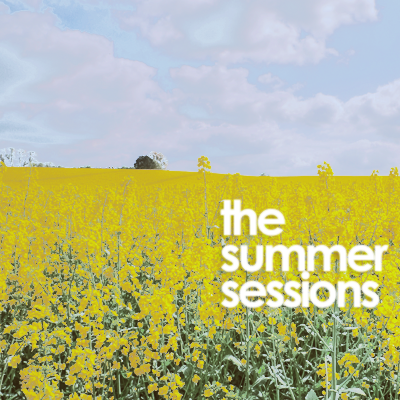
As Summer Sessions 2011 winds down tonight with the last interview, I'd like to take a moment to thank everybody for participating in this year's project. It was a nice exercise in getting to know your neighbors, and getting a little exposure in the process. I hope all the participants enjoyed themselves, and I look forward to doing it again next year. Now the last interview of 2011, where I attempt to sound cool and witty. Thanks for playing, I'll see you next time.
SESSION TEN: MAGEN TOOLE, INTERVIEWED BY BERIT ELLENGSEN
Drawing on a familiarity with the anxious and the alienated, weird and dark fiction Magen Toole takes some time to discuss her work, her favorite movies, and her love of bad television.
1) Tell us a little about yourself and your stories.
I come from the Texas plains with an arts background, a love for Star Trek and a need to tell stories about people in otherworldly circumstances. I'm all about character dynamics and interactions, drawing on the supernatural to explore the duality of human nature and concepts of fear in the modern world. My stories are kind of a grab-bag of genres, from the weird to the romantic, the creepy to the surreal. I like to think that makes me entertaining, but I guess we'll have to wait and see if there's any truth to that.
2) Do you have a specific style or genre? If so, what would you call
it or define it as?
If I had to call it a style, I'd say it was minimalism within reason. I like to be as brief and concise as possible without selling my ideas short. Give my characters just enough time and space to tell their stories, and cut out all the fat so the reader is left with the purest impression of my idea. It may be layered with other metaphors, other imagery to flesh the world out, but I hate to waste time on excess detail or diversions. I'll never stop to talk about the drapes or that summer spent backpacking across Europe. The reader can take what he or she will from the story, just so long as I feel they got the best of what I could give them.
On the other hand, I really don't know what genres I write, most days. I'm often published in weird tale, horror and dark fiction magazines and anthologies, so I guess that's the clean answer. I just like to tell stories about people faced with the horror of the world around them, the low-volume dread of loneliness, of alienation from others, of separation from safety and detachment from reality. I usually represent that unknown threat with a monster, whether real or imagined, because giving a fear a face makes it palpable, even if you don't understand why.
3) Is there a message or theme in your work you want to convey to others?
The message varies from story to story, but the theme in my work usually revolves around people struggling against their surroundings. They usually feel out of synch with the world, estranged from others, just outsiders looking in on their particular circumstances. There's almost always a sense of separation for my characters, taking the form in a person or a singular goal, manifesting as a longing or obsession that fuels their actions. My characters are incomplete, unfinished, and afraid of what they might find if they go looking for what they need to fill that void. The worlds I build for my characters are scary places, populated by monsters and the subtle horror of the mundane modern existence. I can't really blame them for being afraid.
Having dealt with social anxiety most of my life, I'm well-acquainted with that sense of fear and alienation. It's easy to write, because I think the modern world makes us feel alienated in a lot of ways. Most things in our lives seem colder, detached, powered by the instant gratification of technology. My generation is still adapting to the world we've come up in, with iPhones and Twitter and the fifteen-minute cable news cycle. We're still sorting out our place in history, and the jury seems out on whether or not we're going to succeed at all. So I think I like to tell stories about outsiders, because as a reader it's easier for me to relate to characters like that.
4) What have been your biggest influences?
Good movies, super hero comic books and bad television. Good movies from guys like David Cronenberg and Tarsem Singh, and genre movies from guys like Rob Zombie and Robert Rodriguez, that taught me there's more than one way to tell horror stories. Super hero comics taught me about adapting mythology and hero folklore traditions to modern audiences, and how to use simple symbols to talk about grand ideas. Bad television, well, that's just fun. Some of my favorite actors do bad television, and do these amazing things with these terrible scripts they're given. Like making gold out of oxygen, they make me believe in these characters they're playing even when the writers have slacked off in the staff room, make me care about these tiny lives they lead. They taught me about sleight of hand, and how a little humanization can hook an audience into a story, no matter how silly.
5) What are your current projects?
At the moment, I'm kicking around ideas for an apocalyptic alternate history series based around the first half of the 20th century, revolving around World War II. I'm working up the lives of the Four Horsemen, four people called to service at the beginning World War I to end the world, and their travels across the planet leading them toward the bombings of Hiroshima and Nagasaki. I'm also workshopping and preparing for my next novel White Bull, the second in the Casey Way Trilogy.
6) I know you have written a novel that you just completed, Flesh
Trap. Can you tell us what it's about and what plans you have for it?
Flesh Trap is a psychological horror and dark fiction novel, looking at how the things we do to ourselves and each other leave holes in the world so profound that others can be pulled in. It centers on the life of Casey Way, a sarcastic, caffeine-junkie insomniac library cataloger who is being haunted by violent visions of his dead rapist father, suffering under the weight of his father's sins for twenty years. One part mystery story, one part psychedelic trip, it follows Casey, his boyfriend Joel and step-sister Mariska as the anniversary of the death of Casey's father approaches, increasing the frequency and brutality of Casey's visions. They come to find that Casey has become the center of a series of deaths, disappearances and attacks, all stemming from a mysterious box that begins following him. With each character working the story from their own angle, their own perspective and motivations, the mystery leads Casey back to his childhood home and the scene of the crime, as he's forced further and further into his own fractured psyche to confront his father and also himself.
I'm planning to release the novel as a free-to-read serial beginning in September. I have an awesome team of volunteers that are helping me put together the website, illustrate the characters and key scenes, and assemble the soundtrack. It's going to be a mixed-media project, art and music backing up the novel chapters. I'm really excited about putting this together.
7) You have said in your blog that you find it difficult to write when
you're happy. Is there anything else you find particularly challenging
about writing?
I usually find myself scratching my head over how to portray horror in my stories. The horror I enjoy as a reader or viewer is largely psychological, examining fear from a more clinical, cerebral level rather than through gore and scares. Not that I don't enjoy my schlock-and-awe movies, because I have my favorites like everybody else, but I like to explore fear as much as possible without automatically going to blood. This is why death and the fear of dying is rarely ever a source of dread in my stories. Most often my characters are afraid of living with something, be it a choice they've made, or a loss, or a larger truth they've discovered along the way. Which is scarier? That's what I have to ask myself every time I sit down to write.
8) Can you tell us about your future projects?
I'm working on the second and third books of the Casey Way Trilogy, expanding on the concepts and themes of the first book, respectively titled White Bull and Nightmare Child. Those are a ways off at the moment, as I'm still getting the first book launched. In the meantime I have plans for a collaborative vampire novella. I'm keen on exploring the idea of the vampire from a more traditional folklore standpoint, making them more of a predatory species than the aristocratic or tragic romantic figures they've become. The novella focuses on a race of vampires that came out of a nomadic gypsy society in Eastern Europe, spreading across Europe and to the Americas in the chaos following World War II, living by the strict mythic traditions of their ancestors in a lifestyle akin to that of Hasidic Judaism. Living like a cloistered religious community, with well-organized means of procuring and distributing blood through human trafficking, vampires are able to live among the people they feed on with little scrutiny from law enforcement.
I'm also working on a bizarro novel about a man who loses his tongue to an aquatic parasite that lives in his mouth, communicating with him telepathically and leading him on a hallucinatory, vaguely criminal joy-ride toward self-improvement.
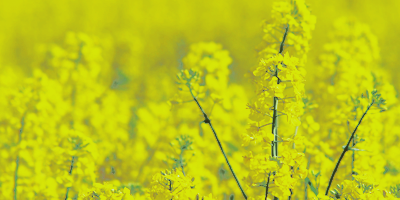
Summer Sessions 2011: Session Ten

As Summer Sessions 2011 winds down tonight with the last interview, I'd like to take a moment to thank everybody for participating in this year's project. It was a nice exercise in getting to know your neighbors, and getting a little exposure in the process. I hope all the participants enjoyed themselves, and I look forward to doing it again next year. Now the last interview of 2011, where I attempt to sound cool and witty. Thanks for playing, I'll see you next time.
SESSION TEN: MAGEN TOOLE, INTERVIEWED BY BERIT ELLENGSEN
Drawing on a familiarity with the anxious and the alienated, weird and dark fiction Magen Toole takes some time to discuss her work, her favorite movies, and her love of bad television.
1) Tell us a little about yourself and your stories.
I come from the Texas plains with an arts background, a love for Star Trek and a need to tell stories about people in otherworldly circumstances. I'm all about character dynamics and interactions, drawing on the supernatural to explore the duality of human nature and concepts of fear in the modern world. My stories are kind of a grab-bag of genres, from the weird to the romantic, the creepy to the surreal. I like to think that makes me entertaining, but I guess we'll have to wait and see if there's any truth to that.
2) Do you have a specific style or genre? If so, what would you call
it or define it as?
If I had to call it a style, I'd say it was minimalism within reason. I like to be as brief and concise as possible without selling my ideas short. Give my characters just enough time and space to tell their stories, and cut out all the fat so the reader is left with the purest impression of my idea. It may be layered with other metaphors, other imagery to flesh the world out, but I hate to waste time on excess detail or diversions. I'll never stop to talk about the drapes or that summer spent backpacking across Europe. The reader can take what he or she will from the story, just so long as I feel they got the best of what I could give them.
On the other hand, I really don't know what genres I write, most days. I'm often published in weird tale, horror and dark fiction magazines and anthologies, so I guess that's the clean answer. I just like to tell stories about people faced with the horror of the world around them, the low-volume dread of loneliness, of alienation from others, of separation from safety and detachment from reality. I usually represent that unknown threat with a monster, whether real or imagined, because giving a fear a face makes it palpable, even if you don't understand why.
3) Is there a message or theme in your work you want to convey to others?
The message varies from story to story, but the theme in my work usually revolves around people struggling against their surroundings. They usually feel out of synch with the world, estranged from others, just outsiders looking in on their particular circumstances. There's almost always a sense of separation for my characters, taking the form in a person or a singular goal, manifesting as a longing or obsession that fuels their actions. My characters are incomplete, unfinished, and afraid of what they might find if they go looking for what they need to fill that void. The worlds I build for my characters are scary places, populated by monsters and the subtle horror of the mundane modern existence. I can't really blame them for being afraid.
Having dealt with social anxiety most of my life, I'm well-acquainted with that sense of fear and alienation. It's easy to write, because I think the modern world makes us feel alienated in a lot of ways. Most things in our lives seem colder, detached, powered by the instant gratification of technology. My generation is still adapting to the world we've come up in, with iPhones and Twitter and the fifteen-minute cable news cycle. We're still sorting out our place in history, and the jury seems out on whether or not we're going to succeed at all. So I think I like to tell stories about outsiders, because as a reader it's easier for me to relate to characters like that.
4) What have been your biggest influences?
Good movies, super hero comic books and bad television. Good movies from guys like David Cronenberg and Tarsem Singh, and genre movies from guys like Rob Zombie and Robert Rodriguez, that taught me there's more than one way to tell horror stories. Super hero comics taught me about adapting mythology and hero folklore traditions to modern audiences, and how to use simple symbols to talk about grand ideas. Bad television, well, that's just fun. Some of my favorite actors do bad television, and do these amazing things with these terrible scripts they're given. Like making gold out of oxygen, they make me believe in these characters they're playing even when the writers have slacked off in the staff room, make me care about these tiny lives they lead. They taught me about sleight of hand, and how a little humanization can hook an audience into a story, no matter how silly.
5) What are your current projects?
At the moment, I'm kicking around ideas for an apocalyptic alternate history series based around the first half of the 20th century, revolving around World War II. I'm working up the lives of the Four Horsemen, four people called to service at the beginning World War I to end the world, and their travels across the planet leading them toward the bombings of Hiroshima and Nagasaki. I'm also workshopping and preparing for my next novel White Bull, the second in the Casey Way Trilogy.
6) I know you have written a novel that you just completed, Flesh
Trap. Can you tell us what it's about and what plans you have for it?
Flesh Trap is a psychological horror and dark fiction novel, looking at how the things we do to ourselves and each other leave holes in the world so profound that others can be pulled in. It centers on the life of Casey Way, a sarcastic, caffeine-junkie insomniac library cataloger who is being haunted by violent visions of his dead rapist father, suffering under the weight of his father's sins for twenty years. One part mystery story, one part psychedelic trip, it follows Casey, his boyfriend Joel and step-sister Mariska as the anniversary of the death of Casey's father approaches, increasing the frequency and brutality of Casey's visions. They come to find that Casey has become the center of a series of deaths, disappearances and attacks, all stemming from a mysterious box that begins following him. With each character working the story from their own angle, their own perspective and motivations, the mystery leads Casey back to his childhood home and the scene of the crime, as he's forced further and further into his own fractured psyche to confront his father and also himself.
I'm planning to release the novel as a free-to-read serial beginning in September. I have an awesome team of volunteers that are helping me put together the website, illustrate the characters and key scenes, and assemble the soundtrack. It's going to be a mixed-media project, art and music backing up the novel chapters. I'm really excited about putting this together.
7) You have said in your blog that you find it difficult to write when
you're happy. Is there anything else you find particularly challenging
about writing?
I usually find myself scratching my head over how to portray horror in my stories. The horror I enjoy as a reader or viewer is largely psychological, examining fear from a more clinical, cerebral level rather than through gore and scares. Not that I don't enjoy my schlock-and-awe movies, because I have my favorites like everybody else, but I like to explore fear as much as possible without automatically going to blood. This is why death and the fear of dying is rarely ever a source of dread in my stories. Most often my characters are afraid of living with something, be it a choice they've made, or a loss, or a larger truth they've discovered along the way. Which is scarier? That's what I have to ask myself every time I sit down to write.
8) Can you tell us about your future projects?
I'm working on the second and third books of the Casey Way Trilogy, expanding on the concepts and themes of the first book, respectively titled White Bull and Nightmare Child. Those are a ways off at the moment, as I'm still getting the first book launched. In the meantime I have plans for a collaborative vampire novella. I'm keen on exploring the idea of the vampire from a more traditional folklore standpoint, making them more of a predatory species than the aristocratic or tragic romantic figures they've become. The novella focuses on a race of vampires that came out of a nomadic gypsy society in Eastern Europe, spreading across Europe and to the Americas in the chaos following World War II, living by the strict mythic traditions of their ancestors in a lifestyle akin to that of Hasidic Judaism. Living like a cloistered religious community, with well-organized means of procuring and distributing blood through human trafficking, vampires are able to live among the people they feed on with little scrutiny from law enforcement.
I'm also working on a bizarro novel about a man who loses his tongue to an aquatic parasite that lives in his mouth, communicating with him telepathically and leading him on a hallucinatory, vaguely criminal joy-ride toward self-improvement.

July 21, 2011
The illustrated world of Flesh Trap
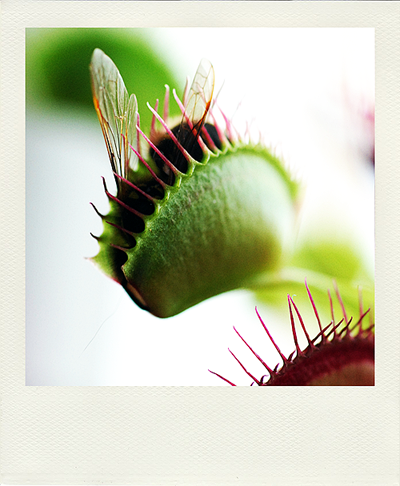
Photo by Kriss Szkurlatowski
At Jay's Diner Casey drank coffee and wrote in his journal. Harold sat in the booth across from him, long and skinny with his mess of greased hair and lip-ring. His skin stuck to the leather seat where his colorful t-shirt and cargo shorts showed, making a squeaking sound whenever he covered his mouth to a cough. Up close he had a white stud in his nose and gold irises, details Casey had taken for granted under the dingy light of the Grab-N-Go. There was a neat square carved into his chest, heart thumping wildly between his splintered ribs, peeled open like knotted fingers. The blood trickling from the corner of Harold's eyes made Casey lean away as it began to pool on the scratched tabletop. Harold licked his dry lips.
"Hey," Harold said wetly, mouth beginning to fill with blood. It oozed down his chin to collect with all the rest, running off the table and onto the floor. "I think you left something at the store, man."
You may already know a little bit about Flesh Trap. This is a story about friends-of-friends.
Not so long ago, I met Anna Yoken through Melissa Dominic. At the time Melissa was just my friend (before she was my best friend and then my super-best-friend, more-than-my-super-best-friend, then finally just my girlfriend because I got tired of all the hyphens) and Anna was by default a friend-of-a-friend. They knew each other from their years of writing original character RPs together. (Proper fiction rRPs, mind you, nothing to do with orcs and wizards.) I didn't know her very well, not really. Just from second-hand conversations, linked into samples of her art and snippets of writing, whenever Melissa was explaining the lives of their old characters that she was maybe-possibly-definitely-certainly going to do something with in the future. Hazy not-so-distant futures, street kids, assassins, time-and-space-traveling gingers up to no good. All I knew was that I enjoyed her drawings and their collective wealth of stories, even if I knew very little about the proper context and timelines.
So I was a fan of Anna's, if only from afar. Little did I know, she was becoming a fan of mine.
Fast forward a few months. A few AIM chat logs and several emails. The odd discussion on bowling while intoxicated. Lots of intellectual discourse about hipster hair cuts and white hi-tops and medical fetish amputee porno. Long story short, a collaboration is born: My words, Anna's style, and the illustrated world of Flesh Trap. And I'm so thrilled to see it come to life.
It's still early days, but Anna's sent me some of her sketches and I'm already excited to see the final drafts. Here's a sample of the work so far.
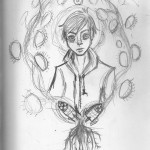
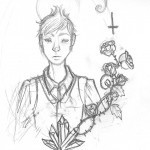
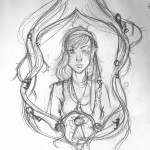
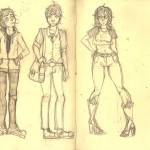
More coming soon. (I hope, I hope.) You can find more of Anna's work at her Carbonmade and deviantART portfolios, and on Tumblr.
The illustrated world of Flesh Trap

Photo by Kriss Szkurlatowski
At Jay's Diner Casey drank coffee and wrote in his journal. Harold sat in the booth across from him, long and skinny with his mess of greased hair and lip-ring. His skin stuck to the leather seat where his colorful t-shirt and cargo shorts showed, making a squeaking sound whenever he covered his mouth to a cough. Up close he had a white stud in his nose and gold irises, details Casey had taken for granted under the dingy light of the Grab-N-Go. There was a neat square carved into his chest, heart thumping wildly between his splintered ribs, peeled open like knotted fingers. The blood trickling from the corner of Harold's eyes made Casey lean away as it began to pool on the scratched tabletop. Harold licked his dry lips.
"Hey," Harold said wetly, mouth beginning to fill with blood. It oozed down his chin to collect with all the rest, running off the table and onto the floor. "I think you left something at the store, man."
You may already know a little bit about Flesh Trap. This is a story about friends-of-friends.
Not so long ago, I met Anna Yoken through Melissa Dominic. At the time Melissa was just my friend (before she was my best friend and then my super-best-friend, more-than-my-super-best-friend, then finally just my girlfriend because I got tired of all the hyphens) and Anna was by default a friend-of-a-friend. They knew each other from their years of writing original character RPs together. (Proper fiction rRPs, mind you, nothing to do with orcs and wizards.) I didn't know her very well, not really. Just from second-hand conversations, linked into samples of her art and snippets of writing, whenever Melissa was explaining the lives of their old characters that she was maybe-possibly-definitely-certainly going to do something with in the future. Hazy not-so-distant futures, street kids, assassins, time-and-space-traveling gingers up to no good. All I knew was that I enjoyed her drawings and their collective wealth of stories, even if I knew very little about the proper context and timelines.
So I was a fan of Anna's, if only from afar. Little did I know, she was becoming a fan of mine.
Fast forward a few months. A few AIM chat logs and several emails. The odd discussion on bowling while intoxicated. Lots of intellectual discourse about hipster hair cuts and white hi-tops and medical fetish amputee porno. Long story short, a collaboration is born: My words, Anna's style, and the illustrated world of Flesh Trap. And I'm so thrilled to see it come to life.
It's still early days, but Anna's sent me some of her sketches and I'm already excited to see the final drafts. Here's a sample of the work so far.




More coming soon. (I hope, I hope.) You can find more of Anna's work at her Carbonmade and deviantART portfolios, and on Tumblr.
Summer Sessions 2011: Session Nine
 SESSION NINE: REBECCA BLAIN, INTERVIEWED BY J.A. PAK
SESSION NINE: REBECCA BLAIN, INTERVIEWED BY J.A. PAKWith a love of nature, animals and tea, fantasy author Rebecca Blain shares with us a little bit about her work, her world, and her thoughts on coffee-drinkers. You can find more on Rebecca at her website and writing blog.
If you could change one thing about your own writing, what would it be?
This is a hard question. There are so many ways that I could improve my writing. If I had to pick one, however, I would pick my tendency to repeat myself when I describe things. That, and my flaw of forgetting to write down some important details I know but the reader doesn't!
You are a passionate tea drinker. Now V.S. Naipaul claims that he can tell whether a writer is male or female by just reading a paragraph. Can you tell if a writer is a tea drinker or coffee drinker? What are the tell-tale signs?
Oh my. If I had to give a knee-jerk reaction, you can tell the tea drinker as the person who stares at the mugs and cups as if analyzing them. Cups make a difference with tea. Not so much with coffee. I also identify the coffee drinkers as those who look glassy-eyed and ready to quit existence after not having a hit in an hour. The more zombie they look, the likelier they drink coffee, in my opinion!
If you could distill your writing into tea, what kind of tea would it be? And what time of day would you drink it?
I think my writing would be a flavored white — I think the type of white would be really determined by the day of the week. Sometimes I'm a smooth cup of white coconut creme, smooth finish and a great start. Others, I'm a white mixed with chamomile, a rough start and leaves an interesting aftertaste on the tongue. As for the time of day, I would definitely be an afternoon tea. Mornings are for chai and a swift kick in the rump. Or a nice breakfast tea.
You concentrate your fiction in the fantasy realm. If you were given the chance to fashion the world you would be born into next, what would that world look like? Can you write a paragraph for us as if it were a novel, knowing you would be an inhabitant? And who would you be? What role would you play?
Oooh ho. This is a tricky question. I'll start with the who I would be and what role I would play. I don't think I would really want to change who I am right now — I like what I do, and I like my dreams. Even my fantasy worlds steal from the real world. It is the hardships of our life and world that make us who we are.
That said, I would rig things so that people were more considerate to the planet. It makes me sound like a hippy (I'm not, really), but I enjoy blue skies, mild sunsets and clean waters.
How does one put into words the perfect world? It is my own, but fewer cities, cleaner cities, nicer people and fresh air not tainted with smog. If I had to make one change, it would be to encourage people to be more understanding of other cultures, religions and skin color, however lame that sounds.
(Who am I kidding? I would be Queen of the Universe and everyone would be my minion. Go, slave, fetch me some tea — and don't screw it up!)




